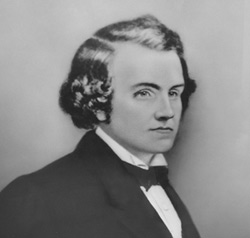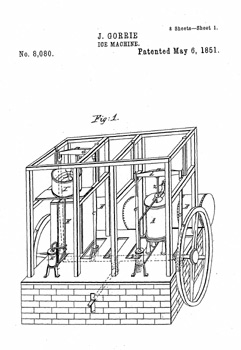 John Gorrie is considered the father of refrigeration and air conditioning. Gorrie’s medical research involved the study of yellow fever. At the time of his research, it was widely believed that bad air was the cause of many diseases. Gorrie also noticed that outbreaks of yellow fever were less frequent in the winter. He was convinced that cold was a healer. This led Gorrie to cool the sickrooms of his patients to reduce fever and make them more comfortable.
John Gorrie is considered the father of refrigeration and air conditioning. Gorrie’s medical research involved the study of yellow fever. At the time of his research, it was widely believed that bad air was the cause of many diseases. Gorrie also noticed that outbreaks of yellow fever were less frequent in the winter. He was convinced that cold was a healer. This led Gorrie to cool the sickrooms of his patients to reduce fever and make them more comfortable.
Gorrie cooled the rooms with a basin of ice suspended from the ceiling. The cool air would flow across the patient and through an opening in the floor. This was a successful method in to cool the room. Ice was hard to come by though. The ice had to be cut from the northern lakes, stored in underground icehouses and shipped packed in sawdust via boat to Florida.
Gorrie began experimenting with ways to make his own artificial ice. His work was based on the principal that as a liquid evaporates, it extracts heat from the air making it cooler. Gorrie’s device used two double force pumps to condense and then rarify air to manufacturer blocks of ice.
 Dr. Gorrie applied for a patent for his invention on February 27, 1848. He received patent #8080 on May 6, 1851 for an improved process for the artificial production of ice. Although his machine produced ice in quantity, the operations were sometimes impaired by leaks and irregular performance.
Dr. Gorrie applied for a patent for his invention on February 27, 1848. He received patent #8080 on May 6, 1851 for an improved process for the artificial production of ice. Although his machine produced ice in quantity, the operations were sometimes impaired by leaks and irregular performance.
Gorrie did not have enough money to begin manufacturing his invention on his own. He went to New Orleans to raise capital to manufacture and market his device. He was unable to find any backers. Problems in product demand, operation of the ice machine and opposition by the ice lobby discouraged investors.
Gorrie never achieved any success from his invention. Instead, he was humiliated by criticism and financially ruined. He died in seclusion on June 29, 1855 in Apalachicola, Florida. Today’s ice machines function on the same principals as Gorrie’s invention.
